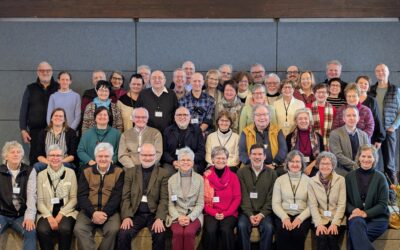We love our brothers and sisters, and with this we know that we have passed from death to life.
‘We know…’ The Apostle is referring to a knowledge that comes from experience. It’s like saying: ‘We’ve experienced it, we’ve touched it with our hands.’ It’s the experience that the Christians evangelized by John had at the beginning of their conversion. When we put God’s commandments into practice, in particular the commandment of love for others, we enter the very life of God.
But do Christians today have this experience? They certainly know that God’s commandments have a practical purpose. Jesus constantly insists that it’s not enough to listen to the Word of God; it must be lived (see Mt. 5:19; 7:21; 7:26).
Instead, what’s not clear to most, either because they don’t know about it or because their knowledge is purely theoretical without having had the experience, is the marvellous feature of the Christian life the Apostle puts into light. When we live out the commandment of love, God takes possession of us, and an unmistakeable sign of this is that life, that peace, that joy he gives us to taste already on earth. Then everything is lit up, everything becomes harmonious. No longer is there any separation between faith and life. Faith becomes the force pervading and linking all our actions.
We love our brothers and sisters, and with this we know that we have passed from death to life.
This word of life tells us that love for our neighbour is the royal road leading us to God. Since we are all his children, nothing is more important to him than our love for our brothers and sisters. We cannot give him any greater joy than when we love our brothers and sisters.
And since love of neighbour brings us union with God, it is an inexhaustible wellspring of inner light, it is a fountain of life, of spiritual fruitfulness, of continual renewal. It prevents the rot, rigidity and slackness that can set in among the Christian people; in a word, we pass ‘from death to life’. When, instead, love is lacking, everything withers and dies. Knowing this, we can understand why certain attitudes are so widespread in today’s world: a lack of enthusiasm and ideals, mediocrity, boredom, longing to escape, loss of values, and so on.
We love our brothers and sisters, and with this we know that we have passed from death to life.
The brothers and sisters the Apostle refers to here are, above all, the members of the communities we belong to. If it is true that we must love everyone, it is equally true that our love must begin with those who normally live with us, and then reach out to all of humanity. We should think in first place of the members of our family, the people we work with, those who are part of our parish, religious community or association. Our love for our neighbour would not be real and well-ordered if it didn’t start here. Wherever we find ourselves, we are called to build the family of the children of God.
We love our brothers and sisters, and with this we know that we have passed from death to life.
This word of life opens up immense horizons. It urges us along the divine adventure of Christian love with its unforeseeable outcomes. Above all it reminds us that in a world like ours, where the theory is of struggle, the survival of the fittest, the shrewdest, the most unscrupulous, and where at times everything seems paralysed by materialism and egoism, the answer we should give is love of neighbour. When we live the commandment of love, in fact, not only is our life energized, but everything around is affected. It’s like a wave of divine warmth, which spreads and grows, penetrating relationships between one person and another, one group and another, and bit by bit transforming society.
So, let’s go for it! Brothers and sisters to love in the name of Jesus are something we all have, and that we always have. Let’s be faithful to this love. Let’s help many others be so. We will know in our soul what union with God means. Faith will revive, doubts disappear, no more will we know what boredom is. Life will be full, very, very full.
Chiara Lubich
First published in May 1985.




0 Comments